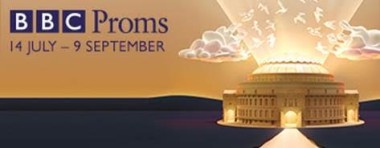
 United Kingdom 2017 BBC PROM 13 – Malcolm Sargent’s 500th Prom: Beatrice Rana (piano); BBC Symphony Orchestra / Sir Andrew Davis (conductor). Royal Albert Hall, London, 24.7.2017. (CC)
United Kingdom 2017 BBC PROM 13 – Malcolm Sargent’s 500th Prom: Beatrice Rana (piano); BBC Symphony Orchestra / Sir Andrew Davis (conductor). Royal Albert Hall, London, 24.7.2017. (CC)

Trad (arr. Wood) – The National Anthem
Berlioz – Overture, Le Carnaval romain
Schumann – Piano Concerto in A minor, Op.54
Elgar – Overture, Cockaigne (In London Town)
Walton – Façade, Suite No.1 & Suite No.2, Popular Song
Holst – The Perfect Fool, ballet music
Delius – On Hearing the First Cuckoo in Spring
Britten – Variations and Fugue on a Theme of Henry Purcell, Op.34, “The Young Person’s Guide to the Orchestra”
Prom 13 took the form of a trip back in time for a reconstruction of the 500th Prom conducted by Sir Malcolm Sargent on the First Night of the 1966 season (July 23). And who better than Sir Andrew Davis, confirmed Prom favourite and famed Last Night speech giver, to lead the evening? That should really be incentive to go, but actually my reason for covering this Prom was very different: the pianist Beatrice Rana.
Silver medallist in the Van Cliburn Competition in 2013 (and also winner of the Audience Award: her progress in that competition is wonderfully tracked in the 2015 film Virtuosity: The Fourteenth Van Cliburn International Piano Competition on Euroarts DVD/Blu-ray). Rana has gone on to record a lauded Bach Goldberg Variations, a coupling of the Prokofiev Second and Tchaikovsky First Piano Concertos plus a disc coupling the Chopin Préludes with Scriabin’s Second Sonata. Her Van Cliburn performances were unforgettable (the competition was streamed live for free on the internet), and in the flesh one can hear what the fuss is about, too. The Schumann was far from a war-horse. Sporting a glittery dress which I am reliably informed can be called a “mermaid dress” in turquoise, her Schumann was a delight. Her touch is incredibly malleable, reflecting the mercurial nature of her reading. But allied to this was a real intelligence rare in the younger generation; a true indicator of this is the quality of her voice-leading, impeccable throughout. This intelligence coupled with musicality and verve is a rare commodity these days, but Rana has it in spades. The first movement cadenza was remarkable in its chordal placings, as was the sense of fantasy she brought. Dialogue between soloist and orchestra in the central Intermezzo was beautifully done, thanks to Davis’s handling of the strings (in fact he accompanied well throughout) while Rana found the heart of the finale’s swagger.
Rana’s phrasing throughout was incredibly natural; her predecessor in 1966 had been Dame Maura Lympany. Rana did her proud. There was an encore, the Schumann/Liszt Widmung, nicely done. The first “half” of this long Prom had included Sir Henry’s large-forces version of the National Anthem (which gave the organ a chance to shine) and Berlioz’s overture Le Carnaval romain, which uses material from his great opera, Benvenuto Cellini. The cor anglais theme was beautifully given by Max Spiers, while Davis negotiated the tricky structural corners with seasoned ease.
After the interval came a procession of five pieces, all English. And how more English can one get than Elgar’s Cockaigne (In London Town)? It certainly seemed home territory to Davis, who led a performance of superb assurance, the marching band giving us a whiff of the open air, while elsewhere lyrical melodies blossomed expansively or were caressed expressively. This was a magnificent account, and a reminder that English music performed at this high standard is absolutely a key aspect of the Proms. The Albert Hall organ gave the performance a unique aspect in its closing pages.
The very different palette of William Walton came next, in the Façade Suite No.1, plus the “Popular Song” from Suite No.2. From the shadowy “Valse” to the wonderfully witty “Jodelling Song” (Edith Sitwell’s spelling), this was as suave and witty a performance as one can imagine. Ever the showman (remember his Last Night speeches?), Andrew Davis revelled in turning to the audience at the end of numbers. Holst’s ballet music (four dances) from The Perfect Fool features the elements of Earth, Water and Fire. The irregular rhythms of “Earth” were particularly impressive; following on, Delius’ On Hearing the First Cuckoo in Spring was sleepily pleasant (although the piece is not as sleepy as its companion piece, Summer Night on the River, which Davis conducted in the Last Night in 1989).
First Barenboim on Brexit, now Davis much less controversially, reminiscing on Sir Malcom Sargent and the Proms; is speech-making the trend for the season, I wonder? Still, it was entertaining before the familiar strains of the Purcell theme from The Young Person’s Guide to the Orchestra sounded out. This performance was as tight as they come, with each setting revelling in their moment in the limelight, from eloquent cellos to creamy lower brass. The Fugue led excitingly to the final, grand statement of the theme in the brass – the perfect end to an impressive night. And just a closing reminder: Beatrice Rana is most definitely a pianist worth keeping an eye on.
Colin Clarke
For more about the BBC Proms click here.